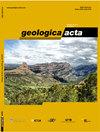Devonian-Mississippian faulting controlled by WNW-ESE-striking structural grain in Proterozoic basement rocks in Billefjorden, central Spitsbergen
IF 2
4区 地球科学
Q2 GEOLOGY
引用次数: 0
Abstract
In Billefjorden, central Spitsbergen, Devonian collapse and Carboniferous rift-related sedimentary strata were deposited unconformably over Proterozoic basement rocks displaying well developed N-S-trending Caledonian grain. Caledonian structures and fabrics are thought to have controlled the location and trend of subsequent Devonian and Carboniferous basin-bounding faults like the Billefjorden fault zone and Lemströmfjellet–Løvehovden fault. However, fieldwork and interpretation of aerial photographs in Proterozoic basement rocks reveal the existence of steep, abundant, WNW-ESE-striking brittle faults that are sub-orthogonal to known major Caledonian and post-Caledonian structures in Billefjorden, but that do not extend into adjacent-overlying, rift-related, Pennsylvanian rocks of the Gipsdalen Group. Structural analysis of field data and aerial photographs suggest that WNW-ESE-striking faults in basement rocks in Billefjorden formed as (sinistral) strike-slip and normal faults during Devonian-Mississippian extension in agreement with previously inferred models of sinistral transtension. The abundance of these faults suggest that their formation was controlled by analogously trending, preexisting structural grain (planar anisotropies) at depth, and their pronounced WNW-ESE strike suggest that the strike of preexisting anisotropies were comparable to recently identified, crustal-scale, WNW-ESE-striking Timanian thrust systems in Svalbard and the northern Barents Sea.斯匹次卑尔根中部Billefjorden地区元古界基底中受西北西东向构造颗粒控制的泥盆纪-密西西比期断裂
在斯匹次卑尔根中部的Billefjorden,泥盆纪崩塌和石炭纪裂谷相关沉积地层不整合地沉积在元古代基岩上,显示出发育良好的南北走向加里东晶粒。加里东构造和组构被认为控制了随后的泥盆纪和石炭纪盆地边界断层的位置和走向,如Billefjorden断层带和Lemströmfjellet–Løvehovden断层。然而,对元古代基岩的实地调查和航空照片的解释表明,存在陡峭、丰富、西西西-东东东走向的脆性断层,这些断层与Billefjorden已知的主要加里东期和后加里东期构造次正交,但没有延伸到Gipsdalen群的相邻上覆裂谷相关宾夕法尼亚岩中。现场数据和航空照片的结构分析表明,Billefjorden基岩中的WNW ESE走向断层在泥盆纪-密西西比伸展期间形成为(左旋)走滑和正断层,与先前推断的左旋平移模型一致。这些断层的丰度表明,它们的形成是由类似的趋势控制的,在深度上预先存在的结构颗粒(平面各向异性),其明显的WNW-ESE走向表明,预先存在的各向异性的走向与最近发现的斯瓦尔巴群岛和巴伦支海北部的地壳规模的WNW-ESE走向Timanian逆冲系统相当。
本文章由计算机程序翻译,如有差异,请以英文原文为准。
求助全文
约1分钟内获得全文
求助全文
来源期刊

Geologica Acta
地学-地质学
CiteScore
2.50
自引率
6.70%
发文量
13
审稿时长
>12 weeks
期刊介绍:
- Relevant conceptual developments in any area of the Earth Sciences.
- Studies presenting regional synthesis.
- Thematic issues or monographic volumes presenting the results from one or more research groups.
- Short papers reflecting interesting results or works in progress.
- Contributions and results from Research Projects, Workshops, Symposiums, Congresses and any relevant scientific activity related to Earth Sciences.
- Geologica Acta aims to stimulate rapid diffusion of results and efficient exchange of ideas between the widespread communities of Earth Science researchers (with special emphasis on Latinamerica, the Caribbean, Europe, the Mediterranean
 求助内容:
求助内容: 应助结果提醒方式:
应助结果提醒方式:


